Released: 1973
Directed by: Bill Gunn
Contains spoilers
This review is of the complete edition of Ganja and Hess, which is essentially a director’s cut with three extra minutes of footage previously unreleased to the home market. It should be noted that the additional footage is of a lower quality than the rest of the film. This film was first shown at the Critics’ Week at the 1973 Cannes Festival, to a standing ovation. Unfortunately, from what I can gather, it was then butchered to create a blaxploitation flick. I have never seen the re-cut version, but having seen this original vision I must say that it seems as though that were a sin.
The film itself is most definitely arthouse, filled with startling images, soliloquy and oblique reference and runs at an, almost, languid pace. If such films turn you off then perhaps it is best to leave Ganja and Hess, but then again perhaps not – I’ll explain later.
The film starts with a little text opening in which we discover that Dr Hess Green (Duane Jones) is a doctor of anthropology and geology and was studying the black civilisation of Myrthia. We discover that he was stabbed three times, in remembrance of the trinity, and became an addict who was unable to die or be killed – actually not quite true. We then hear a voice-over by Reverend Williams (Sam Waymon), a minister but also, to earn extra money, both a chauffeur and stableman for Hess. He tells us that Hess was not a criminal but a victim and that his addiction was to blood.
Hess meets his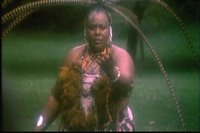 new assistant, George Meda (Bill Gun), a strange man who tells a meandering and unfunny story over dinner that does not amuse his new employer. Having dreamt about the people of Myrthia and a knife from that culture, Hess awakens and finds Meda in a tree with a noose nearby. He is self-admittedly neurotic and has thought of suicide in the past. Later he attacks Hess in bed and, following a struggle, grabs the Myrthia knife and stabs Hess.
new assistant, George Meda (Bill Gun), a strange man who tells a meandering and unfunny story over dinner that does not amuse his new employer. Having dreamt about the people of Myrthia and a knife from that culture, Hess awakens and finds Meda in a tree with a noose nearby. He is self-admittedly neurotic and has thought of suicide in the past. Later he attacks Hess in bed and, following a struggle, grabs the Myrthia knife and stabs Hess.
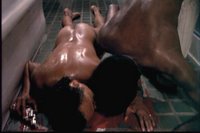 Meda composes a pretentious suicide note that underlines his neurosis and then bathes himself. Meanwhile Hess has awakened without a mark upon him. Meda holds the gun to his own chest and fires, killing himself. Hess goes to him and is going to ring, presumably the police, when he is drawn to the blood and ends up lapping it from the floor.
Meda composes a pretentious suicide note that underlines his neurosis and then bathes himself. Meanwhile Hess has awakened without a mark upon him. Meda holds the gun to his own chest and fires, killing himself. Hess goes to him and is going to ring, presumably the police, when he is drawn to the blood and ends up lapping it from the floor.
At first Hess, to survive, steals from blood banks. However, in a bar, a pimp (Tommy Lane) sets him up with a girl (Candece Tarpley). The aim is to rob Hess and the doctor is stabbed but the knife does not bother him. The girl shoots him and this has no effect either. He kills them both, and in a marvellous scene we see him cut the girls throat and blood spurt out of the artery to the rhythm of her heart – it is just a pity that the blood is a little orange though that could be due to a faded transfer.
Meda’s wife, Ganja (Marlene Clark), turns up looking for her husband and Hess tells her he has gone away.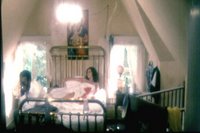 However, she has not enough money for a hotel and ends up staying with him and they soon become lovers. Hess goes to the city, where he approaches a girl with a baby. Meanwhile Ganja insinuates herself into the wine cellar, a place only Hess must enter, and finds the frozen corpse of her husband in a walk in freezer. We see Hess in the girl’s apartment, her baby cries somewhere and she is on the bed soaked in blood.
However, she has not enough money for a hotel and ends up staying with him and they soon become lovers. Hess goes to the city, where he approaches a girl with a baby. Meanwhile Ganja insinuates herself into the wine cellar, a place only Hess must enter, and finds the frozen corpse of her husband in a walk in freezer. We see Hess in the girl’s apartment, her baby cries somewhere and she is on the bed soaked in blood.
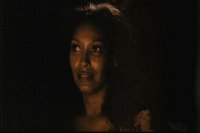 Ganja has assumed that Hess has killed her husband but, in a marvellously shot and acted soliloquy we realise that Ganja’s philosophy is that she must do all that is best for herself and, despite the fact that she believes Hess to be psychotic they marry. The service is interesting as, understatedly, we see a Mythrian briefly in the background – so briefly that perhaps it can be almost missed -and we have intercut scenes of husband and wife disposing of Meda’s frozen corpse.
Ganja has assumed that Hess has killed her husband but, in a marvellously shot and acted soliloquy we realise that Ganja’s philosophy is that she must do all that is best for herself and, despite the fact that she believes Hess to be psychotic they marry. The service is interesting as, understatedly, we see a Mythrian briefly in the background – so briefly that perhaps it can be almost missed -and we have intercut scenes of husband and wife disposing of Meda’s frozen corpse.
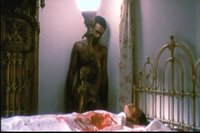 On their wedding night Hess tells Ganja that he wants her to live forever and stabs her with the knife, making her as he is. Unfortunately, it seems that she has no taste for killing.
On their wedding night Hess tells Ganja that he wants her to live forever and stabs her with the knife, making her as he is. Unfortunately, it seems that she has no taste for killing.
The vampire lore is unusual; most aspects are shown to us visually, through dreamlike sequences and in throw away comments.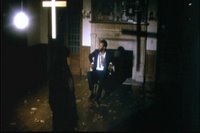 Their bodies are cold permanently, they are addicted to blood, they seem immortal and yet, as I intimated earlier they can die. The method of destruction is also unusual; it is achieved by having the shadow of a religious icon of good (say the cross) rest upon their heart.
Their bodies are cold permanently, they are addicted to blood, they seem immortal and yet, as I intimated earlier they can die. The method of destruction is also unusual; it is achieved by having the shadow of a religious icon of good (say the cross) rest upon their heart.
The acting is excellent, Clark as Ganja is at turns unpleasant and yet understandable. She can bait and be bitchy and yet we realise exactly where she has come from and why she acts that way. Hess seems aloof and yet carries a dignity or perhaps even a resignation to his condition, he is the addict, unable to go cold turkey and yet cognisant of the predicament he finds himself in. The soundtrack is an astonishing mix of more traditional African music, soul and gospel which combine to weave a rich aural tapestry and the direction, whilst at times languid, offers the film a definitive feel and character.
The film itself is about addiction, true, but it is also about victims and aggressors and the way they can be interchangeable, it is also about redemption.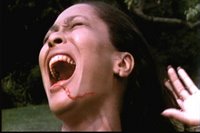 It is chock full of startling and sometimes savage imagery but by its very nature the film is not going to appeal to all. To quote David Kalat’s liner notes for the DVD “Perhaps you will find this movie oblique, off-putting or just plain strange. That’s your prerogative. But I dare say even if you find you don’t ‘get’ it, you will never fully expunge Ganja and Hess from your mind.” It is rare that liner notes are accurate, never mind insightful and this is why I said at the head of the review that, even if such films as this are not your cup of tea, perhaps you should watch this one.
It is chock full of startling and sometimes savage imagery but by its very nature the film is not going to appeal to all. To quote David Kalat’s liner notes for the DVD “Perhaps you will find this movie oblique, off-putting or just plain strange. That’s your prerogative. But I dare say even if you find you don’t ‘get’ it, you will never fully expunge Ganja and Hess from your mind.” It is rare that liner notes are accurate, never mind insightful and this is why I said at the head of the review that, even if such films as this are not your cup of tea, perhaps you should watch this one.
One for those who like films such as “The Addiction” (1995), in style, and “Martin” (1976), in pace, though whilst those films share a feel of Ganja and Hess they are not the same beast. Probably a love it or hate it movie, I loved it and will give the film 8 out of 10.
The imdb page is here.
Directed by: Bill Gunn
Contains spoilers
This review is of the complete edition of Ganja and Hess, which is essentially a director’s cut with three extra minutes of footage previously unreleased to the home market. It should be noted that the additional footage is of a lower quality than the rest of the film. This film was first shown at the Critics’ Week at the 1973 Cannes Festival, to a standing ovation. Unfortunately, from what I can gather, it was then butchered to create a blaxploitation flick. I have never seen the re-cut version, but having seen this original vision I must say that it seems as though that were a sin.
The film itself is most definitely arthouse, filled with startling images, soliloquy and oblique reference and runs at an, almost, languid pace. If such films turn you off then perhaps it is best to leave Ganja and Hess, but then again perhaps not – I’ll explain later.
The film starts with a little text opening in which we discover that Dr Hess Green (Duane Jones) is a doctor of anthropology and geology and was studying the black civilisation of Myrthia. We discover that he was stabbed three times, in remembrance of the trinity, and became an addict who was unable to die or be killed – actually not quite true. We then hear a voice-over by Reverend Williams (Sam Waymon), a minister but also, to earn extra money, both a chauffeur and stableman for Hess. He tells us that Hess was not a criminal but a victim and that his addiction was to blood.
Hess meets his
 new assistant, George Meda (Bill Gun), a strange man who tells a meandering and unfunny story over dinner that does not amuse his new employer. Having dreamt about the people of Myrthia and a knife from that culture, Hess awakens and finds Meda in a tree with a noose nearby. He is self-admittedly neurotic and has thought of suicide in the past. Later he attacks Hess in bed and, following a struggle, grabs the Myrthia knife and stabs Hess.
new assistant, George Meda (Bill Gun), a strange man who tells a meandering and unfunny story over dinner that does not amuse his new employer. Having dreamt about the people of Myrthia and a knife from that culture, Hess awakens and finds Meda in a tree with a noose nearby. He is self-admittedly neurotic and has thought of suicide in the past. Later he attacks Hess in bed and, following a struggle, grabs the Myrthia knife and stabs Hess. Meda composes a pretentious suicide note that underlines his neurosis and then bathes himself. Meanwhile Hess has awakened without a mark upon him. Meda holds the gun to his own chest and fires, killing himself. Hess goes to him and is going to ring, presumably the police, when he is drawn to the blood and ends up lapping it from the floor.
Meda composes a pretentious suicide note that underlines his neurosis and then bathes himself. Meanwhile Hess has awakened without a mark upon him. Meda holds the gun to his own chest and fires, killing himself. Hess goes to him and is going to ring, presumably the police, when he is drawn to the blood and ends up lapping it from the floor.At first Hess, to survive, steals from blood banks. However, in a bar, a pimp (Tommy Lane) sets him up with a girl (Candece Tarpley). The aim is to rob Hess and the doctor is stabbed but the knife does not bother him. The girl shoots him and this has no effect either. He kills them both, and in a marvellous scene we see him cut the girls throat and blood spurt out of the artery to the rhythm of her heart – it is just a pity that the blood is a little orange though that could be due to a faded transfer.
Meda’s wife, Ganja (Marlene Clark), turns up looking for her husband and Hess tells her he has gone away.
 However, she has not enough money for a hotel and ends up staying with him and they soon become lovers. Hess goes to the city, where he approaches a girl with a baby. Meanwhile Ganja insinuates herself into the wine cellar, a place only Hess must enter, and finds the frozen corpse of her husband in a walk in freezer. We see Hess in the girl’s apartment, her baby cries somewhere and she is on the bed soaked in blood.
However, she has not enough money for a hotel and ends up staying with him and they soon become lovers. Hess goes to the city, where he approaches a girl with a baby. Meanwhile Ganja insinuates herself into the wine cellar, a place only Hess must enter, and finds the frozen corpse of her husband in a walk in freezer. We see Hess in the girl’s apartment, her baby cries somewhere and she is on the bed soaked in blood. Ganja has assumed that Hess has killed her husband but, in a marvellously shot and acted soliloquy we realise that Ganja’s philosophy is that she must do all that is best for herself and, despite the fact that she believes Hess to be psychotic they marry. The service is interesting as, understatedly, we see a Mythrian briefly in the background – so briefly that perhaps it can be almost missed -and we have intercut scenes of husband and wife disposing of Meda’s frozen corpse.
Ganja has assumed that Hess has killed her husband but, in a marvellously shot and acted soliloquy we realise that Ganja’s philosophy is that she must do all that is best for herself and, despite the fact that she believes Hess to be psychotic they marry. The service is interesting as, understatedly, we see a Mythrian briefly in the background – so briefly that perhaps it can be almost missed -and we have intercut scenes of husband and wife disposing of Meda’s frozen corpse. On their wedding night Hess tells Ganja that he wants her to live forever and stabs her with the knife, making her as he is. Unfortunately, it seems that she has no taste for killing.
On their wedding night Hess tells Ganja that he wants her to live forever and stabs her with the knife, making her as he is. Unfortunately, it seems that she has no taste for killing.The vampire lore is unusual; most aspects are shown to us visually, through dreamlike sequences and in throw away comments.
 Their bodies are cold permanently, they are addicted to blood, they seem immortal and yet, as I intimated earlier they can die. The method of destruction is also unusual; it is achieved by having the shadow of a religious icon of good (say the cross) rest upon their heart.
Their bodies are cold permanently, they are addicted to blood, they seem immortal and yet, as I intimated earlier they can die. The method of destruction is also unusual; it is achieved by having the shadow of a religious icon of good (say the cross) rest upon their heart.The acting is excellent, Clark as Ganja is at turns unpleasant and yet understandable. She can bait and be bitchy and yet we realise exactly where she has come from and why she acts that way. Hess seems aloof and yet carries a dignity or perhaps even a resignation to his condition, he is the addict, unable to go cold turkey and yet cognisant of the predicament he finds himself in. The soundtrack is an astonishing mix of more traditional African music, soul and gospel which combine to weave a rich aural tapestry and the direction, whilst at times languid, offers the film a definitive feel and character.
The film itself is about addiction, true, but it is also about victims and aggressors and the way they can be interchangeable, it is also about redemption.
 It is chock full of startling and sometimes savage imagery but by its very nature the film is not going to appeal to all. To quote David Kalat’s liner notes for the DVD “Perhaps you will find this movie oblique, off-putting or just plain strange. That’s your prerogative. But I dare say even if you find you don’t ‘get’ it, you will never fully expunge Ganja and Hess from your mind.” It is rare that liner notes are accurate, never mind insightful and this is why I said at the head of the review that, even if such films as this are not your cup of tea, perhaps you should watch this one.
It is chock full of startling and sometimes savage imagery but by its very nature the film is not going to appeal to all. To quote David Kalat’s liner notes for the DVD “Perhaps you will find this movie oblique, off-putting or just plain strange. That’s your prerogative. But I dare say even if you find you don’t ‘get’ it, you will never fully expunge Ganja and Hess from your mind.” It is rare that liner notes are accurate, never mind insightful and this is why I said at the head of the review that, even if such films as this are not your cup of tea, perhaps you should watch this one.One for those who like films such as “The Addiction” (1995), in style, and “Martin” (1976), in pace, though whilst those films share a feel of Ganja and Hess they are not the same beast. Probably a love it or hate it movie, I loved it and will give the film 8 out of 10.
The imdb page is here.

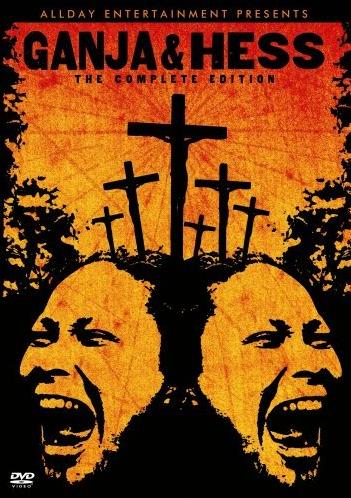















7 comments:
How in the heck I could have left this one out of my top 20 I'll never know. I love this film and it only gets better with repeated viewings. What I wanted to point out, though, is that while it is nothing short of a vamp revelation that we finally got to see Gunn's original cut, the vhs entitled Blood Couple is far from being worthless, if only for one scene (and what a *doozy* it is!) in particular. This scene I mention has Ganja being chased around inside a room by the shadow of the cross (displayed on the walls) in a supernatural shadowy kind of way that has to bee seen to be believed. I cannot understand why Gunn chose to leave this out because it's one of the most fascinating sequences in either version. I wish the dvd had included in the extras for more vampire fans to see, or for that matter why not just include the whole Blood Couple edit? Which does have an entirely different feel, there's no doubt about it.
HofK, is that footage in the version released as Black Vampire?
Taliesin-
I have never actually viewed the Black Vampire vhs so I can't say whether it is or not. I used to see Black Vampire around years ago at my local video store, but I never bothered with it because I had the Blood Couple tape. If I were a gambling man, though, I would bet it probably does have the scene, and if you can score the tape cheap it might be worth the roll of the dice. : )
HofK, a friend recently bought it hoping it was the obscure Larence Jordan film but it turned out to be the Ganja and Hess re-edit. She asked whether I wanted to see that cut... I think I'll say yes, now.
btw, many thanks for the subtitle heads-up iro Sveto Mesto and Lepterica - managed to get synced subs re the latter and reviews will be forthcoming.
Great news Taliesin and I look forward to the upcoming review. Btw, if the Ganja scene I speak of is in this print, it'll be right close to the end, you'll find it a few minutes before the end credits roll. Good luck and let me know what you think of it if it's there.
Ganja & Hess soundtrack- 4/21/18 contact your local record store to make sure they stock this.
Strange Disc Records distributed by Light in the Attic Records.
Oh and “Blood Couple” is on a DVD compilation called “Creatures Critters and Crazies” this is from deleted scenes & it’s a totally different and amazing film.
Tom, I've deleted the extra comments. Comment moderation is on hence the comment didn't appear at first.
I assume Blood Couple is a similar cut to "Black Vampire" or is it substantially different?
Post a Comment